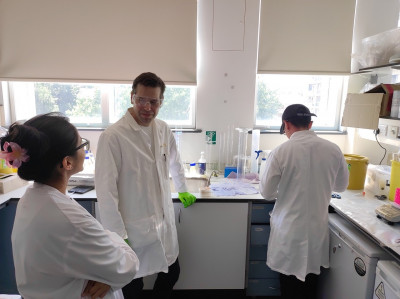News
Professor Thomas Iskratsch secures £1.2 million British Heart Foundation programme grant
10 July 2025

Prof Thomas Iskratsch, Professor in Cardiovascular Mechanobiology and Bioengineering, has been awarded a highly coveted Programme Grant of £1.2 million from the British Heart Foundation (BHF). This significant funding will support groundbreaking research into how mechanical forces contribute to cardiovascular disease, a leading cause of mortality worldwide.
Professor Iskratsch's research aims to understand why our blood vessels sometimes change in stiffness and contribute to heart disease. Imagine your arteries as flexible pipes that carry blood - when blood flows through them, it creates pressure and stretches the pipe walls. This research focuses on special cells in these walls, called vascular smooth muscle cells.
"We're trying to figure out how these everyday mechanical forces like the pressure from blood flow or the stiffness of the artery wall itself cause these cells to change," explains Professor Iskratsch.
"Normally, these cells help the artery contract and relax, but in disease, they lose this ability and start to remodel the artery wall, making the problem worse. Our new data suggests that increased blood pressure alone can trigger a change, and we believe it's linked to alterations in the fats (lipids) within the cells, which then affect how genes are controlled. This grant will allow us to investigate this crucial connection between increased pressure and these lipid changes."
Understanding this fundamental process is vital. By uncovering the precise molecular pathways involved, the team hopes to identify new targets for drugs and therapies that could prevent or reverse the progression of cardiovascular diseases, ultimately improving heart health for millions globally.
This ambitious project is a truly collaborative endeavour, bringing together leading experts from various institutions. Key collaborators include Professor Qingzhong Xiao from Queen Mary's William Harvey Research Institute, Professor Duncan Graham and Dr Nicholas Rattray from University of Strathclyde, and Professor Cathy Shanahan from King’s College London.
The project also benefits from an industry partnership with AstraZeneca, which is providing specialised analysis methods, including high-resolution mass-spectrometry imaging. This enhances the project's capabilities, allowing for deeper insights into the complex cellular changes.
The research team anticipates uncovering the molecular pathways that link hypertensive pressure to the formation of lipid droplets within cells. They will also investigate how these lipid droplets might fuel the detrimental changes in cell behaviour, their effect on cell and nuclear mechanics, and ultimately, how these processes lead to altered gene regulation. These findings are expected to pave the way for innovative new therapeutic strategies.
| Contact: | Ayden Wilkes |
| Email: | a.wilkes@qmul.ac.uk |
| People: | Thomas ISKRATSCH |




